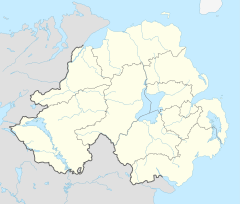Gortin
Gortin
|
|
|---|---|
 |
|
| Gortin shown within Northern Ireland | |
| Population | 360 (2001 Census) |
| Irish grid reference | H491858 |
| District | |
| County | |
| Country | Northern Ireland |
| Sovereign state | United Kingdom |
| Post town | Omagh |
| Postcode district | BT79 |
| Dialling code | 028 |
| EU Parliament | Northern Ireland |
| UK Parliament | |
| NI Assembly | |
Gortin (from Irish: an Goirtín, meaning "the small enclosed field") is a village and townland in County Tyrone, Northern Ireland. It is ten miles (16 km) north of Omagh in the valley of the Owenkillew river, overlooked by the Sperrins. It had a population of 360 at the 2001 Census.
In the 1840s Gortin was in the barony of Strabane. Its 410 inhabitants lived in 81 houses indifferently built and so placed as to form one irregular street. A writer at the time described the surrounding scenery, though bold, as "generally destitute of beauty from the want of wood, which is found only at Beltrim, a residence surrounded by young and thriving plantations".
A court baron for the manor of Eliston, in which debts to the amount of 40 shillings was recoverable was held on the first Tuesday of each month and petty sessions were held once a month. The fair was held on the first Wednesday of each month and a pleasure fair was held each Easter Monday. Gortin was the residence of the landlord Major A.R.Cole-Hamilton as well as a large area of country surrounding the village and is called Beltrim Castle. The present castle is a modern building and the only part of the original castle which remains standing is a gable wall which at present no part of the modern building. The landlord built two Protestant churches on the estate, which was so large that the landlord was able to ride around it on horseback in a day. He was a keen sportsman and preserved the game. It was well known that if a tenant on the estate possessed a dog which could and did kill a hare and the story went to the landlord's ears, the tenant got orders to have the dog destroyed at once, and if the tenant was not prepared to do so he got "notice to quit". There was a bailiff kept on the estate whose principal duty was the control of the bog for turf cutting, who as well as his other duties, kept an eye on the progress of the tenantry and if anyone of them reclaimed any land or otherwise improved his holdings, so that the tenant was able to produce a couple of extra stacks of oats, his rent was immediately increased. The landlord served on the Grand jury, was a Magistrate, and Chairman of the local petty sessions, Chairman of the local board of guardians, who supervised the local workhouse and was always able to "rule the roost" and everyone else connected with these bodies were merely "yes" men.
...
Wikipedia

